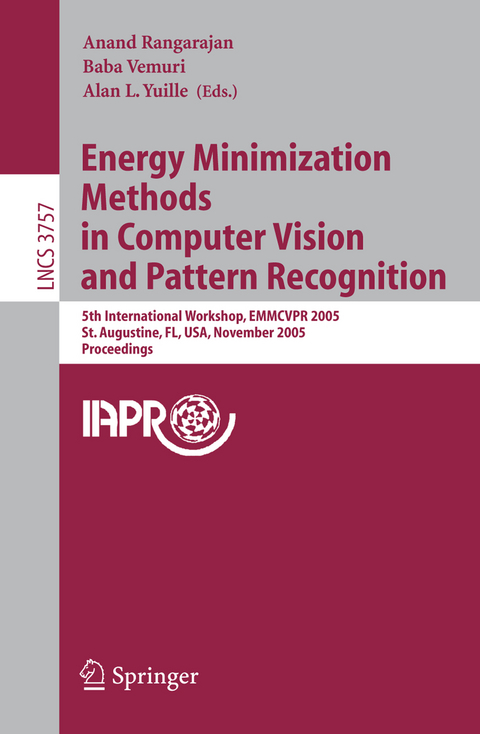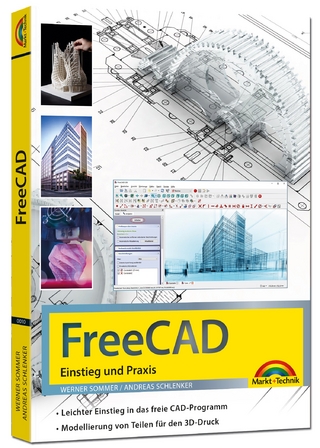
Energy Minimization Methods in Computer Vision and Pattern Recognition
Springer Berlin (Verlag)
978-3-540-30287-2 (ISBN)
Probabilistic and Informational Approaches.- Adaptive Simulated Annealing for Energy Minimization Problem in a Marked Point Process Application.- A Computational Approach to Fisher Information Geometry with Applications to Image Analysis.- Optimizing the Cauchy-Schwarz PDF Distance for Information Theoretic, Non-parametric Clustering.- Concurrent Stereo Matching: An Image Noise-Driven Model.- Color Correction of Underwater Images for Aquatic Robot Inspection.- Bayesian Image Segmentation Using Gaussian Field Priors.- Handling Missing Data in the Computation of 3D Affine Transformations.- Maximum-Likelihood Estimation of Biological Growth Variables.- Deformable-Model Based Textured Object Segmentation.- Total Variation Minimization and a Class of Binary MRF Models.- Exploiting Inference for Approximate Parameter Learning in Discriminative Fields: An Empirical Study.- Combinatorial Approaches.- Probabilistic Subgraph Matching Based on Convex Relaxation.- Relaxation of Hard Classification Targets for LSE Minimization.- Linear Programming Matching and Appearance-Adaptive Object Tracking.- Extraction of Layers of Similar Motion Through Combinatorial Techniques.- Object Categorization by Compositional Graphical Models.- Learning Hierarchical Shape Models from Examples.- Discontinuity Preserving Phase Unwrapping Using Graph Cuts.- Retrieving Articulated 3-D Models Using Medial Surfaces and Their Graph Spectra.- Spatio-temporal Segmentation Using Dominant Sets.- Stable Bounded Canonical Sets and Image Matching.- Coined Quantum Walks Lift the Cospectrality of Graphs and Trees.- Variational Approaches.- Geodesic Image Matching: A Wavelet Based Energy Minimization Scheme.- Geodesic Shooting and Diffeomorphic Matching Via Textured Meshes.- An Adaptive Variational Model for Image Decomposition.- Segmentation Informed by Manifold Learning.- One-Shot Integral Invariant Shape Priors for Variational Segmentation.- Dynamic Shape and Appearance Modeling Via Moving and Deforming Layers.- Energy Minimization Based Segmentation and Denoising Using a Multilayer Level Set Approach.- Constrained Total Variation Minimization and Application in Computerized Tomography.- Some New Results on Non-rigid Correspondence and Classification of Curves.- Edge Strength Functions as Shape Priors in Image Segmentation.- Spatio-temporal Prior Shape Constraint for Level Set Segmentation.- A New Implicit Method for Surface Segmentation by Minimal Paths: Applications in 3D Medical Images.- Other Approaches and Applications.- Increasing Efficiency of SVM by Adaptively Penalizing Outliers.- Locally Linear Isometric Parameterization.- A Constrained Hybrid Optimization Algorithm for Morphable Appearance Models.- Kernel Methods for Nonlinear Discriminative Data Analysis.- Reverse-Convex Programming for Sparse Image Codes.- Stereo for Slanted Surfaces: First Order Disparities and Normal Consistency.- Brain Image Analysis Using Spherical Splines.- High-Order Differential Geometry of Curves for Multiview Reconstruction and Matching.
| Erscheint lt. Verlag | 31.10.2005 |
|---|---|
| Reihe/Serie | Image Processing, Computer Vision, Pattern Recognition, and Graphics | Lecture Notes in Computer Science |
| Zusatzinfo | XII, 666 p. |
| Verlagsort | Berlin |
| Sprache | englisch |
| Maße | 155 x 233 mm |
| Gewicht | 2080 g |
| Themenwelt | Informatik ► Grafik / Design ► Digitale Bildverarbeitung |
| Schlagworte | 3D • affine transform • Algorithm analysis and problem complexity • Algorithmic Learning • Clustering • Cognition • computer vision • Energy Minimization • Geometric Computing • Image Analysis • image classification • Image Segmentation • learning • Neural networks • Object recognition • Optimization • pattern recognition • programming • Segmentation • Simulated annealing • Variable |
| ISBN-10 | 3-540-30287-5 / 3540302875 |
| ISBN-13 | 978-3-540-30287-2 / 9783540302872 |
| Zustand | Neuware |
| Informationen gemäß Produktsicherheitsverordnung (GPSR) | |
| Haben Sie eine Frage zum Produkt? |
aus dem Bereich


